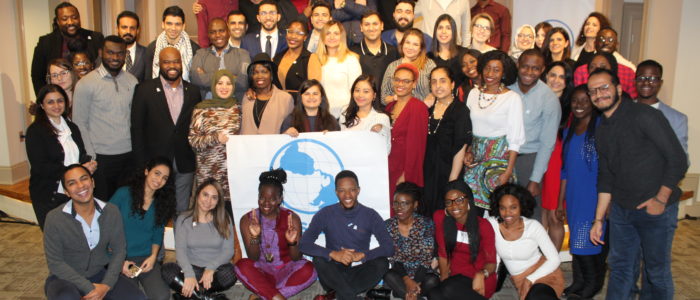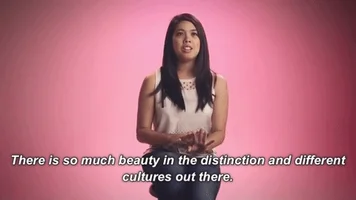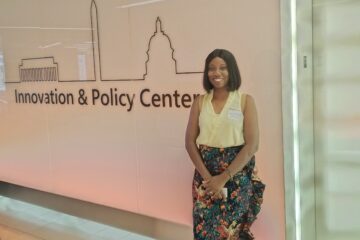The quarterly Atlas Corps Global Leadership Lab Immersion (GLLI) is an opportune time to connect, evaluate, and learn. The recent one, held in January, delivered on that promise. Beyond the food, networking, chat, and amazing ice breakers, there were valuable career and leadership lessons sipping in between the plenary sessions and meet-ups.
In no respective order, I will be sharing ten lessons worth learning (and noting) if you aspire to work in international development. Some of the lessons reinforced what I have learnt in my six months within the Atlas Corps fellowship
I hope you find these lessons useful – whether you are starting a new job, internship, or a fellowship. And if you are reading this as a new (or aspiring) Atlas Corps fellow, I hope these lessons remain valuable for you to have a successful fellowship year.
Caveat: I will be writing from the perspective of being a fellow working in the nonprofits and international development sector in the United States.

Tolerance: As a young leader working in the development space, you will deal with people from other culture – interesting people who share as many similarities and differences than you. Be enthusiastic about understanding them and find ways to integrate yourself into the community you find yourself. Respect other people’s culture and don’t make statements that can be derogatory of other people’s culture, religion, language, food, or ideals. Our relationship with people matters as we progress.
Learning: Never be afraid of stretches. Be enthusiastic about whatever you are learning and be willing to tap into the collective intelligence of your organization or your field of operation. Find a middle ground between working and having fun. The US is full of fun activities and it is easier to get carried away with different events happening all around. Stay focused. Importantly, have a mentor to help you prioritize and shape your goals and don’t be afraid of failure. Seek advice from your supervisor on a career path and don’t rush into anything. Most importantly, think about what you want to do outside fellowship and explore different options beyond education. Be open to accept the support of other people because no one knows it all. As long as you put yourself out there, you will get opportunities.
Surviving the first few months in your new workplace: First of all, be a student of the organization. Listen, be open, be curious, and take time to understand the team/organization dynamics as well as the work culture. Always be ready to reach out, ask questions, and seek feedback on your work and what training you need to be able to do your role more effectively. Be patient and humble enough to do what you are meant to do even if it is a mundane task. Do excellent work wherever you find yourself and everything will take care of itself.

Adapting to the culture: The world operates from a different perspective. If you are from a close-knitted family or community, living in the United States is going to be a little bit “strange”. This is because people mind their business a lot here. The only time you see people chat or talk is mostly during happy hour or lunch. Everything is compartmentalized. Work is work. Play is play. The two rarely mix here. You also have to understand what people say and do when it comes to working. Most time, you are expected to take the initiative and speak up if and when you want something. No room for assumption. As an Atlas Corps fellow, one of the important ways you can adapt to the culture is developing a good relationship with your local ambassador. They will help you navigate and understand the spoken and unspoken culture of the United States.
Skill up!: To survive in the non-profit circle, you need to get good writing skills, personal relationship skills, public speaking skills (especially being able to introduce yourself and what you do in few minutes), and also be a good integrator. Another important skill is culture and people management, proficiency in project management, and how to work well in teams. Learning another language is another valuable skill to learn and you can actually do this by volunteering at the Global Leadership Network (GLN). At GLN, you can teach a language and learn a language in return. Arabic, French, and Spanish are three of the most sought after language in the international development field.
Mentorship: Mentors are very important people. If you work hard and have a good mentor, you are about half-way to achieving your goal. Pick mentor in a field you want to work in and you can also get a referral/recommendation from your mentor on any other respected person in the field you can speak to. Another game-changer is to get to know your mentor’ mentor.
Connecting your work in the US to other international development organization in your home country: I will take a leaf from the message shared by Michael McCabe, USAID’s Agency Youth Coordinator for YouthTalks during the January GLLI. The first thing to do is to understand the organization’s model in the system, the list of projects they run and who they work with. While you are here in the United States, it’s also a great opportunity to seek out their implementing partners in your home country. People support and mostly work with people they know face to face. It’s more compelling and increases your chances for partnership.
Network: This cannot be over-emphasized. One of the important leverage we have as a fellow is the chance to meet different people from different walks of life – from meeting a top-ranking government official at the White House to the coffee waiter down the street and the $1 beggars at the metro station. Holiday parties, public events and LinkedIn are great places to network. It is important to get to know people, meet them, understand what drives them, and nurture this relationship. More importantly, the network within the fellowship – among fellows!. The alumni network is enriched with a super resource I think we, as fellows, rarely pay attention to. The Reciprocity Circles programme anchored by Atlas Corps’s Meredith Newark at the just-concluded GLL is a testament to this fact.

Sell yourself but don’t sell yourself short!: If you are doing well, you have to keep talking about it to people. Beyond social media updates, word-of-mouth is also an effective means to humble-brag about your achievement. None of it is inconsequential.
Walk the talk: Be a person or the kind of leader that motivates your team to do their work. Be functional, empathetic, personable, relatable, confident, and vulnerable when you need to be. This will help you to influence people better and inspire their interest in your vision. As a leader, to keep your team motivated, give them the chance to do their job. Don’t be dismissive, lazy, and without a strategic vision. Finally, lead from within and ensure that trust and empathy are not lacking within your team. As a leader, our role doesn’t have to be from the front, we can also lead from behind like a shepherd.
The list of lessons to learn as a young leader in international development is exhaustive. What lessons have you learnt? In the spirit of fellowship, please share in the comment section.



